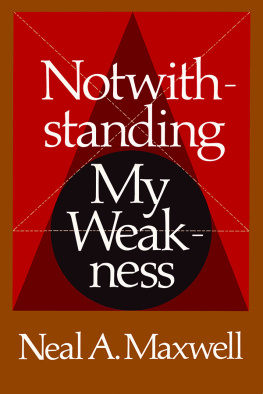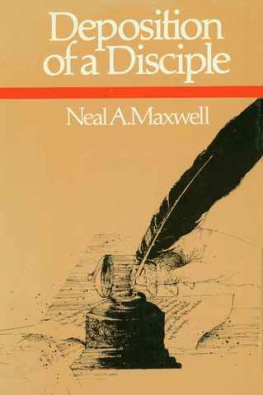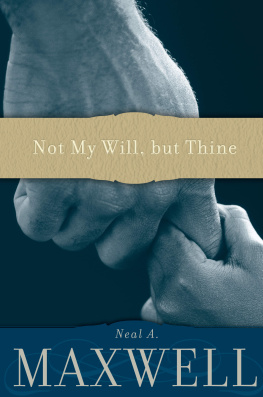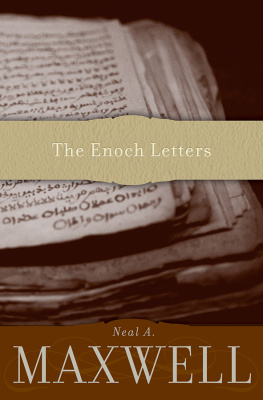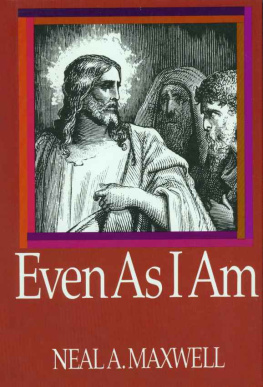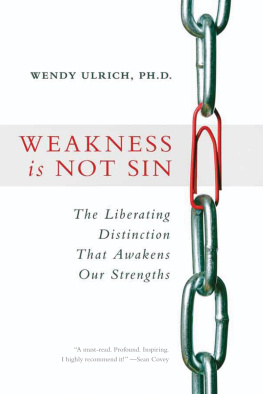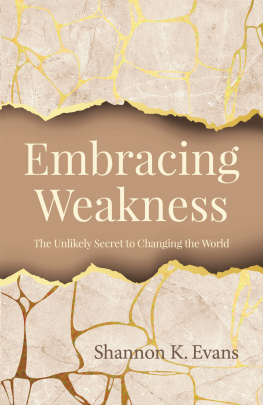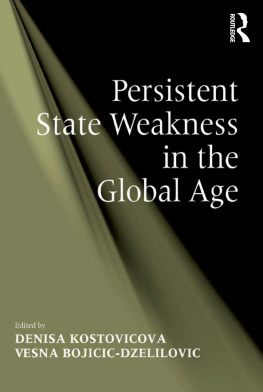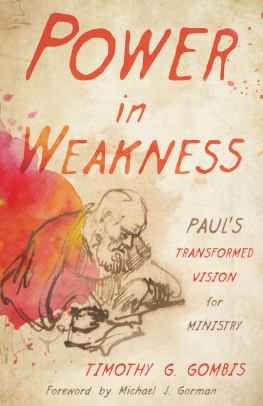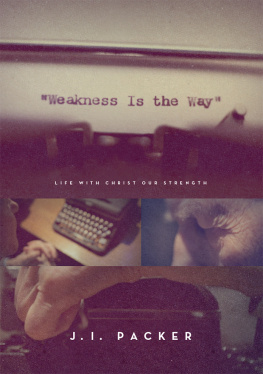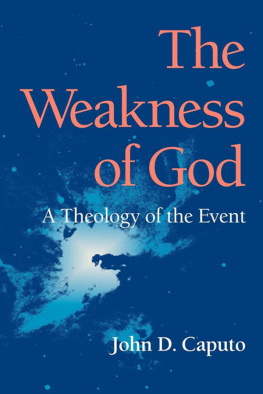Notwithstanding My Weakness
Neal A. Maxwell
1981 Deseret Book Company. All rights reserved. No part of this book may be reproduced in any form or by any means without permission in writing from the publisher, Deseret Book Company, P.O. Box 30178, Salt Lake City, Utah 84130. This work is not an official publication of The Church of Jesus Christ of Latter-day Saints. The views expressed herein are the responsibility of the author and do not necessarily represent the position of the Church or of Deseret Book Company. Deseret Book is a registered trademark of Deseret Book Company.
Acknowledgments
Deep appreciation is expressed to readers Elizabeth Haglund, Jeffrey Holland, Bruce Hafen, Roy W. Doxey, and James Jardinewho are not responsible for what follows but who have made it more responsible.
Special gratitude is due Jeananne Gruwell Hornbarger for her patient processing of words and drafts and in such a congenial way.
Lowell Durham, Jr., and Eleanor Knowles, once again, were encouragers as well as editors to whom thanks are gladly and deservedly given.
Finally, to my wife, Colleen, loving gratitude for suggesting the title and the focus of the book, an effort that she thought I might attemptnotwithstanding my weaknesses, which she experiences more than any other mortal.
Chapter 1
Notwithstanding My Weakness
In a kingdom where perfection is an eventual expectation, our feelings of anxiety and inadequacy should not surprise us. Just as earlier disciples were anxious and even "astonished" as Jesus taught certain demanding doctrines (Mark 10:28), so today there is really no way present prophets can describe where we must yet go without creating a sense of distance. We are not merely journeying next door or even across town.
While this sense of inadequacy has its uses, conscientious Christians not the slackers or the falsely securewhose devotion has been declared in dozens of ways deserve and need some encouragement and reassurance. To such individuals, the counsel is clearly not, "You've got it made," "Take it easy," "Be casual." Rather, it is: "You're headed in the right direction"; "You're doing better than you know"; "Look back, just for a moment, and see how far you've come"; "Do you see those distant lights, even dimly, for they are the lights of the City of God"; "Do not weary or let the adversary deflect you now.
This precious perspective, which features the feasibility of our quest, must not be lost in the midst of our anxieties and stresses.
Church doctrines and Church duties are essential to our personal progress, but also to the retention of this reassurance. We can, for instance, cope with the challenges of continuing our journey notwithstanding our weakness if we truly focus on the two great, overarching commandments on which hang all the law and the prophets. Moreover, we will find sooner or later that we must believe in the whole of His gospelnot just the portions that please us.
Likewise, in these times of hopelessness we must cultivate in ourselves a particularized and "perfect brightness of hope." We will surely need, too, genuine patience, not only with others but also with ourselves, with a divine process, for impatience so often opens the door for despair and contempt.
Furthermore, even though the world worsens and coarsens, we can, notwithstanding, proceed with our Lord-given task of putting off the natural man and becoming saint-like. Simultaneously, though we feel weak, our help is much needed by those hundreds of thousands of converts coming into the Church who will be undertaking the very same "mighty change" in their hearts and lives.
As together we become less spotted by the world and more pure achieving this condition in a time of gross immorality and corruption then we can become worthy of being called "true believers in Christ."
All these things and more can be done notwithstanding our weaknesses, if we are willing to push on in a brisk, but paced, way, remembering always that the Church is the Lord's learning center into which have been "gathered of every kind." Not only are we very much aware, therefore, of our own weaknesses, but we are also aware of each others'.
Perceptive Jethro had plenty of data to back up the loving but crisp counsel he gave so directly to his remarkable son-in-law, Moses. (See Exodus 18.) Even prophets notice their weaknesses. Nephi persisted in a major task, "notwithstanding my weakness." (2 Nephi 33:11.) Another Nephite prophet, Jacob, wrote candidly of his "overanxiety" for those with whom he was not certain he could communicate adequately. (Jacob 4:18.)
President Spencer W. Kimball has had those telling moments when he has felt as if he simply could not meet certain challenges. Yet he did and he does.
Given our weaknesses, however, paced progress is essential, much as God used six measured and orderly creative periods (followed by respite) in preparing man and this earth. There is a difference, therefore, between being steadily and effectively or "anxiously " engaged, on the one hand, and, on the other hand, being frantically engaged one moment and being passive and detached the next.
Lest we wrongly assume that traveling on the straight and narrow path requires hectic pace, let us remember that the Lord does not want us to weary by the way and for very good reasons. Thoughtless haste and spurts of service are not what is desired, for such naivete is like the businessman who confuses volume with profit.
The Lord has clearly indicated His concern for us if we are weary; He has even given us counsel on sleep to avoid that weariness and in order to be vigorous: "cease to sleep longer than is needful; retire to thy bed early, that ye may not be weary; arise early, that your bodies and your minds may be invigorated." (D&C 88:124.)
Moreover, for centuries there has been the vital law of the Sabbath to provide us rest from our regular labors (or at least an appropriate and approved change in the way we expend our energies) from temporal labors to the more spiritual activities of the Sabbath.
The Savior, no stranger to pressure and to weariness, has ever been mindful of His flock.
Happily, we have had preserved for us, through the writings of Mark, an episode in which the press of the crowd was so great on the Savior and His disciples that there was "no leisure so much as to eat." (Mark 6:30-32.) It was, therefore, the Savior's desire to take His disciples privately by ship to a desert place, so that they could obtain much-needed respite, illustrating that where the pace is brisk and people are giving much and constantly, a time of refreshing and renewal is needed.
Much is left to us, however, as to the development of wisdom concerning our laborseven the labors we perform in behalf of the Lord. The counsel the Lord gave the Prophet Joseph Smith in the midst of his urgent and high-priority task of the translation of the Book of Mormon is worthy of our contemplation: "Do not run faster or labor more than ye have strength and means... but be diligent unto the end." (D&C 10:4.) If such counsel was appropriate for the Lord to give to a conscientious young prophet with regard to the translation of the vital Book of Mormon (which of necessity had to precede so many subsequent and great events such as the long-awaited restoration of the Church, the priesthood, and various keys), then surely that same counsel can be appropriately applied to some of the lesser tasks you and I undertake in the Church. The Lord wants us to be diligent but prudent. We are not to give our cross a hurried heft merely to see if we can lift it and then put it downwe are to carry it for the balance of our lives. And pace matters very much. The pioneers crossed the plains in a paced way, arriving weary but intacta lesson for us all!

